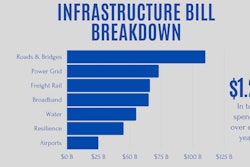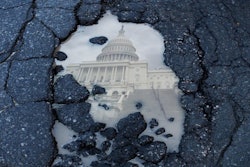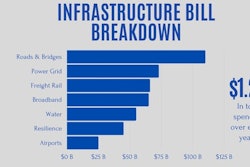The Senate this week began its work on a $1.2 trillion infrastructure package that includes a five-year reauthorization of federal highway and public transportation programs. Jess & Dormie give you an update below on what's happening in Washington and when we can expect a vote on this historic legislation.
Transcript follows:
J: A lot has been happening in Washington over the summer and we didn’t want to bore you every Friday with updates, but there’s some real movement this week so we thought we’d give you all an update on the infrastructure bill. So last month, a bipartisan group of 22 senators introduced a $1.2 trillion infrastructure funding bill. This is significant because there are very little bipartisan negotiations happening anywhere in Washington right now.
D: This week, the senators released the 2,702-page bill, spearheaded by Sen. Rob Portman (R-OH), Sen. Kyrsten Sinema (D-AZ). This deal is substantially narrower than the multi trillion-dollar plan envisioned by President Biden earlier this year but the legislation would authorize more than half a trillion dollars in new spending to bolster the country's roads, bridges and other physical infrastructure.
J: The bill includes a total of $110 billion for roads, bridges, and major transportation projects with $40 billion coming from new funding for bridge repair, replacement and rehabilitation, which is the single largest dedicated bridge investment since the construction of the interstate highway system according to a White House fact sheet. The bill also includes a total of $17.5 billion for major projects that are too large or complex for traditional funding programs but will deliver significant economic benefits to communities.
D: Also included in the bill, and this is important, is the reauthorization of the Highway Trust Fund. The bill features a $118 billion bailout of the Highway Trust Fund from the Treasury’s general fund, essentially an inevitability given lawmakers’ inability to agree on user-fee reforms or increases, but one that has largely gone under the radar and slipped into the bill text at the last minute.
J: The official name for the bill is the Infrastructure Investment and Jobs Act and if passed would add $550 billion in new spending over five years on top of current FAST Act funding levels by incorporating the $303.5 billion highway bill passed unanimously by the Senate Committee on Environment and Public Works in May. The package would authorize the largest amount of funding for surface transportation programs, but transportation experts say the funding is just a fraction of what is needed to address the nation’s backlog of needed repairs, with the latest estimate from the American Society of Civil Engineers estimating a $786 billion backlog for roads and bridges alone. But this is an excellent start to combat our backlog and we will drink to that!
D: Senators have been busy this week negotiating the legislative text. There have been some bumps in the road as lawmakers are worried about how much the bill will add to the federal deficit. They are also busy negotiating a slew of amendments, 281 to be exact. These all need to be settled before a vote can take place. So far, 22 amendments were resolved throughout the week.
J: The big question behind any infrastructure legislation is how to pay for it. Last week, lawmakers were touting $522 billion in “pay-fors,” including $205 billion in repurposing existing COVID-19 relief funds. Congress has provided about $4.7 trillion in emergency assistance in response to the pandemic and the left over money will be used for infrastructure.
D: About $53 billion will come from unemployment insurance aid that the federal government was providing to supplement state unemployment insurance. Dozens of states are declining to take the federal supplement. The plan will also draw about $49 billion by further delaying a Medicare rule giving beneficiaries rebates that now go to insurers and middlemen called pharmacy benefit managers.
J: Other pay-fors include raising an estimated $87 billion in spectrum auctions for 5G services, restarting a tax on chemical manufacturers that had expired in 1995, raising about $13 billion. Also, selling oil from the Strategic Petroleum Reserve would add about $6 billion.
D: Washington also wants to strengthen tax enforcement when it comes to crypto currencies, which will raise about $28 billion. They are also relying on projected economic growth from the investments to bring in about $56 billion.
J: That factor is actually what stalled the vote yesterday. The Biden administration is pushing back against the last-minute effort by the bipartisan group of senators to limit a proposal in the infrastructure bill to increase federal regulation of cryptocurrencies. The fierce lobbying push helped stall plans to finish voting on the bill Thursday night, and now it appears debate will stretch into the weekend. Once all amendments have been discussed, or they close the amendment process, the bill will head for a vote, as early as Saturday! Final passage of the bill could be delayed until at least Monday. If passed, the bill will head to the House. It is not yet determined if the chamber will make changes to the measure and send it back or try to pass the package in its current version.
D: Questions remain about how House Speaker Nancy Pelosi will handle the Infrastructure Investment & Jobs Act after the Senate approves it. She’s getting pressure from the moderates in the caucus to take it up and pass the bipartisan bill immediately, while the liberal wing is pushing her to wait until a reconciliation bill with $3.5 trillion in “human infrastructure” proposals can be considered.
J: President Biden will most likely need to exert his influence to get the physical infrastructure proposal across the finish line. We have our fingers crossed that this will continue to move forward and we will cheers to that!
D: It’s clear this bill will be huge for our industry and on Wednesday, The White House released state fact sheets that highlight the nationwide impact of the Infrastructure Investment and Jobs Act. The fact sheets highlight how the historic legislation will deliver for states and territories across the country to repair roads and bridges, improve transportation options, build a network of Electric Vehicle chargers to accelerate the adoption of EVs and help connect every American to reliable high-speed internet.
J: The $550 billion legislation would touch Americans across the country with numerous industries and regions of the country scoring benefits from the bill. California, the most populous state, would get a minimum of $39 billion, including $25.3 billion for highways and $4.2 billion for bridge replacements and repairs over five years.
D: Texas would get even more for highway projects at $26.9 billion, the White House said. It would also get $537 million for bridge projects. California can also expect to receive $9.45 billion to improve public transportation, $384 million to expand its electrical vehicle charging network and $100 million to help enlarge access to broadband internet.
J: Where we live in Wisconsin, there are 979 bridges and over 1,949 miles of highway in poor condition. Based on formula funding alone, Wisconsin would expect to receive $5.2 billion for federal-aid highway apportioned programs and $225 million for bridge replacement and repairs under the Infrastructure Investment and Jobs Act over five years.
D: Wisconsin can also compete for the $12.5 billion Bridge Investment Program for economically significant bridges and nearly $16 billion of national funding in the bill dedicated for major projects that will deliver substantial economic benefits to communities. Let’s drink to that!
J: That was a lot to cover but we wanted to try and break down what’s happening in Washington in a realistic way for you guys. Things are happening very quickly and we’re covering it as fast as we can on our website, ForConstructionPros.com. Make sure to watch our Facebook pages for updates as they happen. In the meantime, we hope you guys continue to work hard this summer, send us photos of your projects and stay safe out there. Hops & Highways will return this fall! Cheers!



















